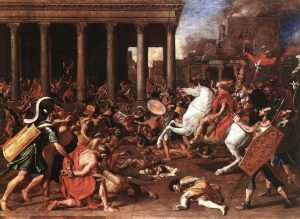Illuminations on the Lectionary readings for Nov. 13, 2022 (Pentecost 23C)
First Reading (Track One): Isaiah 65:17-25
The six-month-long, green-vested season of Sundays after Pentecost is drawing to its close. Jesus and his followers have reached Jerusalem, where we will hear him foretell the destruction of the Temple amid apocalyptic warnings of hard times to come before God brings them into eternal life.

The Destruction of the Temple at Jerusalem (1637), oil painting on canvas by Nicolas Poussin (1594-1665). Kunsthistorisches Museum, Vienna. (Click image to enlarge.)
Listen through the day’s readings for themes of progress through and beyond suffering. In our Track One first reading, from near the end of the Book of Isaiah, the prophet celebrates the people’s return from exile and exults in God’s plan for the new Jerusalem as a joy and a delight. It will be a city where there is no weeping, no distress; no death in childbirth, no pain; rather, its inhabitants will lead joyous lives with 100 years of youthful strength! Then, at the end, it will be a holy place of peace, where the lion and the lamb rest together and none shall hurt or destroy.
First Reading (Track Two): Malachi 4:1-2a
This short Track Two first reading is from the book of Malachi, the last of the twelve so-called minor prophets in the Hebrew Bible. These verses begin its fourth and final chapter. Malachi – whose name in Hebrew means “Messenger,” the word also used for “angel” – speaks of a people newly returned from exile, warning that the great day of the Lord is coming. In language that may remind us of the apocalyptic tone of the gospel, Malachi warns that God will separate evildoers from the righteous and destroy those who do evil. Those who revere God’s name, however, will have healing and joy, “leaping like calves from the stall.”
Psalm (Track One): Isaiah 12:2-6 (Canticle 9 BCP)
These verses from earlier in Isaiah, read as our Track One Psalm for Sunday, are familiar to Episcopalians as Canticle 9, pulled out as a chant to be used in Morning Prayer. The prophet knows that the destruction of the Temple is inevitable, yet nevertheless declares God our stronghold and our sure defense. God can be trusted to save us, the prophet sings, even in threatening times when we feel frightened and vulnerable.
Psalm (Track Two): Psalm 98
In harmony with the prophet Malachi’s vision of God as a righteous healer, Sunday’s Track Two Psalm envisions God as fair and just judge of the world and all its people. When God comes to judge the earth we will sing a new song, lift up our voices, and express our joy so abundantly that even the sea, the lands, the rivers and the hills will jump up and join the celebration. God’s righteousness will be known to all the nations.
Second Reading: 2 Thessalonians 2:1-5, 13-17
Think about these harsh words from our second reading: “Anyone unwilling to work should not eat.” We have probably heard people express similar thoughts about poor people in a modern political setting, a point of view that might make Jesus weep. This illustrates the problem with taking points from the letters of Paul (and in this case, a later follower) as firm instruction for us today. Written in Paul’s name to address issues in a specific community a generation after Paul’s death, this instruction surely dealt with a particular problem of church members who were taking advantage of others’ work. In no way should this quarrel among first century Greek Christians suggest that Jesus’s instruction to feed the hungry and care for the poor has been repealed.
Gospel: Luke 21:5-19
It is tempting, but wrong, to interpret scary readings about apocalyptic events and final judgement as prophesies about our present time. As the long season of Pentecost ends and Advent draws near, we will be hearing more of these in our Sunday readings. The evangelist we know as Luke wrote this Gospel around the end of the first century, some 70 years after the Crucifixion and 30 years after the Romans destroyed Jerusalem and the Temple. He frames these events as a lesson from Jesus, bearing a truth for all times: God is with us. Even when we’re betrayed, scorned, hated and hurt, “By our endurance we will gain our souls.”
